 Last year I worked up a list of the top ten games to be released at Essen 2005. Now that several months have gone by, I've actually had the time to play through all of them (other than no-show Tempus). As a result, this week and next I'm going to offer up a summary of my opinions about the best (and worst) games from my list.
Last year I worked up a list of the top ten games to be released at Essen 2005. Now that several months have gone by, I've actually had the time to play through all of them (other than no-show Tempus). As a result, this week and next I'm going to offer up a summary of my opinions about the best (and worst) games from my list.This week, the top five games, which I grade between an "A" and a "B+", all well above average.
#1: Caylus (A)
My Thoughts: first impression (12/05), comparison to R.E. (2/06), 2nd comparison (2/06)
Authors: William Attia
Synopsis: resource management & city development
Background: France, 1289
U.S. Publisher: Rio Grande Games
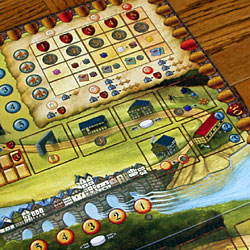 Caylus entered life on BGG with people claiming that early playtesters were artificially inflating the ratings. Several months later, on 2/18/06, two of the top threads at BGG concerned Caylus. One contained a scholary discussion of whether to use your own production buildings, while the other breathlessly asked, which is deeper, 2-player Caylus or Chess?. What a difference a half-a-year makes.
Caylus entered life on BGG with people claiming that early playtesters were artificially inflating the ratings. Several months later, on 2/18/06, two of the top threads at BGG concerned Caylus. One contained a scholary discussion of whether to use your own production buildings, while the other breathlessly asked, which is deeper, 2-player Caylus or Chess?. What a difference a half-a-year makes.There is no question in my mind that Caylus is grossly overhyped and that the alternatively worshipping and over-intellectualized discussions concerning it are excessive. There's also no doubt in my mind that Caylus is a good game. I doubt it deserves to be credited as the #2 game of all time, but I suspect it will stay in the top 3 at BGG, contradicting my stance of last year. I don't know what rating it actually should have, because the length of the game puts it outside of my own enjoyment zone most of the time, much as happened with the previous year's Power Grid, which I'd also acknowledge as a good game.
Caylus' success comes through excellent design of a resource-management mechanic. You are constantly forced to balance spending actions to earn resources and spending actions to spend resources; this is a mechanic that is also used to excellent effect in Union Pacific and Ticket to Ride, and gets the design going from the start. Even once you have a resource, you must also decide in which of multiple ways to use it, and each of those answers can have very different results.
Another real advantage of Caylus is its variability. The game can develop quite differently from play-to-play, and there's also the option for different styles of play to really throw things up in the air. This will help to keep the game fresh.
Caylus' greatest challenge will be its length. It runs too long for casual play. The provost/bailiff mechanic can either shorten or telescope the length (depending on how you look at it), so there's a lot of variability, and I think that's generally to the game's detriment when it goes to the longer side. The amount of strategy in the game is also deceptive. Other than the royal favors, most of the game is pure tactical, with little or no ability to plan more than a turn ahead at best, and that again clashes with the length.
The real reason that I don't think that Caylus deserves to be at a #2 is that it's not a well-developed game. It's pretty good, but there are some sharp edges. I think a good developer would have pulled down the game length, figured out a way for players to have more strategic basis in the buildings that they'd created, without undercutting the basic idea of renting buildings, and would have done something with the provost and bailiff to ensure that they couldn't crack the game length up or down by an hour or more at the players' whim. And that would have made Caylus a top-3 deserving game.
As it is, however, I still rate Caylus as the best of show for Essen 2005, beating the new ed of Reef Encounter by a nose. If you like serious, heavy-strategy games, if you don't mind a 2+ hour game length that can vary wildly, and if you enjoy indie games, sharp edges and all, Caylus was the must-buy from the show.
And let me finish up by offering kudos to Rio Grande who are now making the coins & the new tile from 2nd edition Caylus available to 1st edition purchasers for just $4 sent their way via Paypal. I got my new pieces just a few days after I made my order. Yay for remembering the early purchasers.
#2: Reef Encounter (A)
My Thoughts: Comparison to Caylus (2/06), 2nd Comparison (2/06), Review (2/06)
Authors: Richard Breese
Synopsis: resource management, tile laying & set collection
Background: A Coral Reef
U.S. Publisher: Z-Man Games
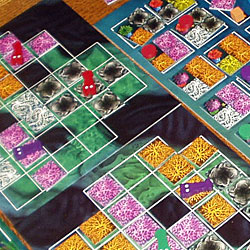 Reef Encounter was first released back in 2004, but in a limited 1000-copy run. It didn't hit the mass market until late 2005 with the Z-Man Games edition. That's a shame because I think it lost a lot of momentum in the meantime, and that it hasn't really received the attention it's deserved since the new release. Reef Encounter was my second Richard Breese game, and after being very disappointed with Keythedral I was very impressed with Reef Encounter.
Reef Encounter was first released back in 2004, but in a limited 1000-copy run. It didn't hit the mass market until late 2005 with the Z-Man Games edition. That's a shame because I think it lost a lot of momentum in the meantime, and that it hasn't really received the attention it's deserved since the new release. Reef Encounter was my second Richard Breese game, and after being very disappointed with Keythedral I was very impressed with Reef Encounter.The solid heart of Reef Encounter is a superb tile-laying game. You have to carefully manage two resources needed to lay tiles (larva cubes and polyp tiles) and you also have to pay a lot of attention to the board(s), figuring out where to lay tiles, and how to do so in such a way as to keep your tiles safe, to generate more resources that you need (in the form of consumed tiles), and to take advanctage of current coral dominance. Reef Encounter's intricate ecology of tiles, cubes, and cylinders really keeps you on your toes.
Reef Encounter also works because it hits two emotional centers that I think are crucial for the best games. The first emotion is anxiety. You're constantly worrying about other players taking your brilliant moves or else attacking your coral--and you can never keep it all safe. The second emotion is joy. You can make the sort of brilliant single-turn moves that you find at the heart of the best tactical games, and really feel like you improved your position notably and meaningfully.
Though Reef Encounter is another indie game, like Caylus, I find it very well polished. Richard Breese knows his art even without an external developer. Still, it does have faults. I have some concerns over the variability of strategy possible. It feels like you always need to move in the same broad directions. I also think that the game could have been much more fruitfully started several turns into the current gameplay without any loss of strategy. And that would have also resolved another problem, which is once again length, though Reef Encounter seems a little shorter than Caylus, and can't telescope to the same extent based solely on player play.
I've gone back & forth on whether I think Caylus or Reef Encounter is actually a better game. Like Caylus I think that Reef Encounter is almost a must-buy for the most serious gamers who don't mind longer fare, with my only concern being eventual replayability.
#3: Il Principe (B+)
My Thoughts: Review (4/06)
Authors: Emanuele Ornella
Synopsis: auction, logistics, majority control
Background: Renaissance Italy
U.S. Publisher: Z-Man Games
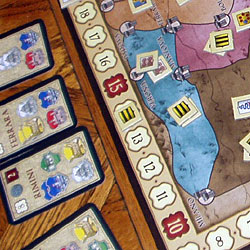 I've had a weird relationship with Italian games these last few years. The more I play games published by daVinci, Mind the Move, ZuGames, and Venice Connection, the more I think that Italian game designers have minds that work in weird ways. I have an increasingly long list of Italian games that just didn't click in my head when I read the rules, and which sometimes befuddled me with their multilayered strategies. It includes Go West, Lucca Citta, Oriente, Ostrakon, Palatinus, and Tuchulcha. And now it includes Il Principe too.
I've had a weird relationship with Italian games these last few years. The more I play games published by daVinci, Mind the Move, ZuGames, and Venice Connection, the more I think that Italian game designers have minds that work in weird ways. I have an increasingly long list of Italian games that just didn't click in my head when I read the rules, and which sometimes befuddled me with their multilayered strategies. It includes Go West, Lucca Citta, Oriente, Ostrakon, Palatinus, and Tuchulcha. And now it includes Il Principe too.Don't get me wrong, this isn't necessarily a bad thing. The Italians are doing things that other designers aren't, and because they're so unusual that sometimes throws me when I try and grasp the games. I also suspect these Italian designers are overloading mechanics more than their modern German brethren, so that a single decision can have many more results, and thus you have to think harder to arrive at a good strategy. I've noted that German games seem to be getting simpler in recent years; perhaps we should be looking to Italy for the next surge of designer games.
But more on all of this in a future article about "The Italian Design Scene"; for now let's talk about Il Principe specifically.
Il Principe has a little bit of everything in it. There are simple auctions which give you resources and those resources can be used to build cities or just to increase you resource majorities. Both building and resource majorities can give you board-based majority control tokens at various times--or even straight-up victory points. The resource majorities actually give their various benefits through an intermediary: a set of 10 roles. You gain majority in a resource, you win a role, then you get a benefit as a result. The systems all work together quite well, but trying to figure out all the various effects and make good look-ahead moves is tough.
In fact overall, I'd say Il Principe is a very tough game: high on the complexity scale--not necessarily in its rules, but instead in its strategy. But, for a complex, logistical game it does great. After a first play I found it fascinating, interesting, and deep and after a second play I felt much less overwhelmed and I was able to play better. It's the same trajectory I followed on the aforementioned Reef Encounter, and I think they both fit the same category of building simple mechanics into complex and meaningful strategy.
#4: Elasund: The First City of Catan (B+)
My Thoughts: Review (11/05)
Authors: Klaus Teuber
Synopsis: city development & conflict
Background: Catan
U.S. Publisher: Mayfair Games
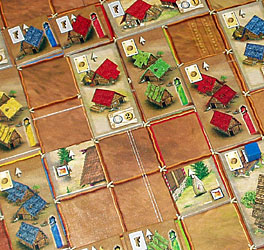 I think a lot of us were kind of expecting another Settlers before we played Elasund and were surprised that it was an original and innovative game, probably Teuber's best new work since ... I'm not sure what.
I think a lot of us were kind of expecting another Settlers before we played Elasund and were surprised that it was an original and innovative game, probably Teuber's best new work since ... I'm not sure what.Elasund is a game of city building where you pay gold to lay down building permits and build building, and sometimes get into conflicts with other players as a result. In many ways Elasund simplifies Teuber's standard idea of random resource creation & management by cutting it down to just those two elements: gold and building permits. But, that's not where the game really is. Instead it's in the potential for interpersonal conflict--the way in which you can steal other people's on-board resources (the building permits) and even destroy their buildings. It's an original conflict style, and ends up creating a game that will probably appeal more to players of Domaine (which also had an original conflict style) than to players of The Settlers of Catan.
However after three games I continue to have the same feeling I had after my first play: it's very dry. I also find the back-and-forth of the Victory Points a little frustrating. As a result of the particular method of conflict, you can almost get to the end of the game, then the winner's top building can get knocked down, adding 30 minutes to the game.
Nonetheless, if you don't mind your games a little dry, and you like some in-your-face conflict, Elasund is a good game. Fans of the original Settlers of Catan need not necessarily apply.
#5: Railroad Tycoon (B+)
My Thoughts: Review (12/05)
Authors: Martin Wallace, Glenn Drover
Synopsis: economic, resource management, connections
Background: United States, The Age of Steam
U.S. Publisher: Mayfair Games
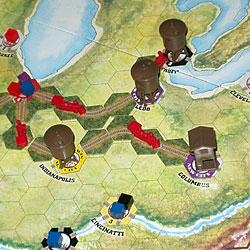 Railroad Tycoon is a fun boardgame that meets many of my criteria for creativity & strategy, but which I will almost never play. The main problem is length, because Railroad Tycoon takes 30-45 minutes to play per player, and the ideal player number is somewhere in the 4-6 range. If I could guarantee a 2-hour game every time, it'd be OK, but when it easily runs 3-4 hours, that's just more than my personal gaming can support.
Railroad Tycoon is a fun boardgame that meets many of my criteria for creativity & strategy, but which I will almost never play. The main problem is length, because Railroad Tycoon takes 30-45 minutes to play per player, and the ideal player number is somewhere in the 4-6 range. If I could guarantee a 2-hour game every time, it'd be OK, but when it easily runs 3-4 hours, that's just more than my personal gaming can support.That's a pity because Railroad Tycoon does a great job of making Wallace's Age of Steam more accessible, and thus more enjoyable for a more casual player like myself. The biggest problem that I have with Age of Steam is its unforgiving nature. If you come up a dollar short you just can't do what you want to it, and this results in intense logistical calculations at the start of every turn. Railroad Tycoon turns that around by the simple act of allowing you to raise money at any time; the core economic system is still there (albeit in a modified form) but now you don't have to plan as far in advance, and there's no opportunity to get shut down by a simple mathematical mistake.
Despite the long game length, I think that downtime is mostly resolved by the use of threaded turns, with each player taking one action at a time. Beyond that you have the essence of Wallace's refined railroading system: construction with tiles, tactical pickup and delivery, and tough economics.
Whether Railroad Tycoon is the epitome of Wallace's railroad games is up for negotiation, but I'll stand by the belief that it's the apex of the system for more casual gamers, particularly more casual Anglo-American gamers, raised on History of the World and Axis & Allies, who are much more used to games of this length than the average Eurogamer.
I find it interesting that I've written in recent times about German games getting lighter and shorter. However, three of my top games here are anything but short. Caylus, Reef Encounter, and Railroad Tycoon all crack the two-hour barrier, which has always been unusual for German games, while Elasund and Il Principe run more in the 1-2 hour range.
Are German games getting more challenging again, or are these games anomalies? I suspect the latter, given that four of the five are originally indie designs (by Ystari, R&D, Warfrog, and Mind the Move), and indie designers haven't been subjected to the same market pressures which are affecting Hans, Kosmos, Alea, and others. Simply put, I bet big profits aren't as big a concern for an indie designer as a corporation.
And as for Klaus Teuber, I bet he gets to publish whatever he wants.
I wouldn't be surprised if, as the next few years progress, the only real gamer's games are coming out indie workshops on the continent, or else from publishers in Italy and America, who seem to have different gaming priorities. But, it'll be a trend to watch for in the future.
Next week I'm going to finish up my Essen list, with a few more games I really like and a number that disappointed me.
1 comment:
Beowulf: Should have been on my list. It only missed because I had it in hand a few months before Essen, so I wasn't thinking of it as a new game by then.I currently rate Beowulf an A-/B+, which means it would have been my #3 Essen game, after Caylus and Reef Encounter.
Here's my full review of Beowulf: http://www.rpg.net/reviews/archive/11/11592.phtml.
Railroad Tycoon: I can agree with your comments about the uneveness of RRT, but I think that's true for a good number of the top Essen games, including Caylus, as I noted. The player numbers trouble me the most. I think there isn't enough competition unless you get 4+ players.
Post a Comment